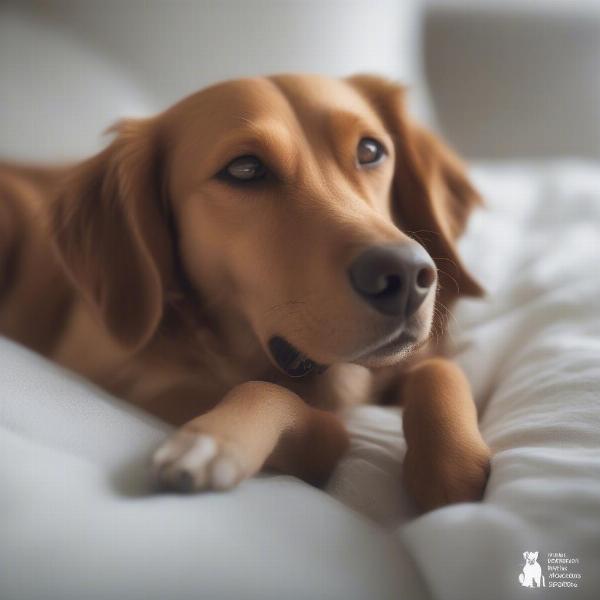The nine in one vaccine for dogs, often referred to as the DHPPi/L, is a crucial part of canine healthcare. It protects against a range of serious and potentially fatal diseases. This comprehensive guide provides everything you need to know about this essential vaccine, from understanding its components to managing potential side effects. Whether you’re a new dog owner or a seasoned pro, this article will empower you to make informed decisions about your dog’s health.
Understanding the Nine in One Vaccine
The nine in one vaccine combines protection against nine common canine diseases: distemper, hepatitis, parvovirus, parainfluenza, and leptospirosis (four serovars). These diseases can cause a range of severe symptoms, from respiratory issues and vomiting to neurological damage and even death. Vaccinating your dog helps build immunity against these threats, protecting them and contributing to overall canine health.
Core vs. Non-Core Vaccines
The components of the nine in one vaccine are considered core vaccines, meaning they are essential for all dogs regardless of lifestyle or location. This is due to the widespread nature and severity of the diseases they protect against. Non-core vaccines, on the other hand, are recommended based on individual risk factors, such as exposure to specific environments or wildlife.
When to Vaccinate Your Dog
Puppies typically receive their first dose of the nine in one vaccine around 6-8 weeks of age, followed by booster shots every 3-4 weeks until they are 16 weeks old. Adult dogs require booster vaccinations, typically annually or every three years, depending on the specific vaccine and your veterinarian’s recommendations. Consult your vet to create a tailored vaccination schedule for your dog.
Why Puppy Vaccinations are Important
Puppies have immature immune systems, making them particularly vulnerable to infectious diseases. The nine in one vaccine helps protect them during this critical period, giving their immune systems the boost they need to fight off these potentially deadly diseases.
Potential Side Effects of the Nine in One Vaccine
While generally safe, the nine in one vaccine can sometimes cause mild side effects, such as soreness at the injection site, lethargy, or a low-grade fever. These symptoms are usually temporary and resolve on their own within a few days. In rare cases, more serious allergic reactions can occur. vaccine side effects dogs can provide more insights into this aspect.
Managing Vaccine Side Effects
If your dog experiences mild side effects, you can provide comfort by offering a warm bed and plenty of fresh water. Monitor them closely, and if the symptoms worsen or persist, contact your veterinarian immediately. Knowing about potential dog shivering after vaccine can help you prepare.
 Managing Vaccine Side Effects
Managing Vaccine Side Effects
The Importance of Regular Veterinary Checkups
Regular veterinary checkups are crucial for maintaining your dog’s overall health, including ensuring they are up-to-date on their vaccinations. Your veterinarian can assess your dog’s individual needs and recommend the appropriate vaccination schedule. The nine-in-one vaccine is often compared to the 6 in one vaccine for dogs, so discuss the best option with your vet.
Conclusion
The nine in one vaccine plays a vital role in protecting dogs from serious diseases. By understanding its components, benefits, and potential side effects, you can make informed decisions about your dog’s health. Always consult your veterinarian to develop a tailored vaccination plan and address any concerns. Explore further on combination vaccines like the 10 way shot for dogs to enhance your understanding.
FAQ
- What does the nine in one vaccine protect against? The nine in one vaccine protects against distemper, hepatitis, parvovirus, parainfluenza, and leptospirosis (four serovars).
- When should my puppy receive their first nine in one vaccine? Typically around 6-8 weeks of age.
- Are there any side effects associated with the nine in one vaccine? Mild side effects like soreness, lethargy, or low-grade fever can occur, but are usually temporary.
- How often does my dog need the nine in one vaccine? Booster vaccinations are typically needed annually or every three years, depending on the specific vaccine.
- What should I do if my dog experiences side effects after vaccination? Monitor them closely, provide comfort, and contact your veterinarian if symptoms worsen or persist.
- Is the nine in one vaccine necessary for all dogs? Yes, it is considered a core vaccine recommended for all dogs.
- Can I give my dog the nine in one vaccine myself? No, vaccinations should always be administered by a qualified veterinarian.
ILM Dog is a leading online resource dedicated to providing expert advice and information on all aspects of dog care, from breed selection and health to training, nutrition, and grooming. We strive to empower dog owners worldwide with the knowledge they need to provide the best possible care for their furry companions. We also offer insights on alternative approaches like nosodes for dogs. For personalized guidance on dog health, including vaccination schedules, connect with us at [email protected] or call us at +44 20-3965-8624. ILM Dog is here to support you every step of the way.